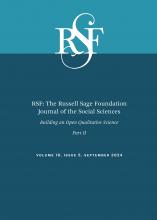Research Article
Open Access
Multiple Meritocracies: A Text-Based Analysis of Personal Narratives Revealing Distinct Frames of Success
Michael Sauder, Yongren Shi, Freda Lynn
RSF: The Russell Sage Foundation Journal of the Social Sciences September 2024, 10 (5) 86-117; DOI: https://doi.org/10.7758/RSF.2024.10.5.04
Michael Sauder
aProfessor in the Department of Sociology and Criminology at the University of Iowa, United States
Yongren Shi
bAssistant professor in the Department of Sociology and Criminology at the University of Iowa, United States
Freda Lynn
aProfessor in the Department of Sociology and Criminology at the University of Iowa, United States

REFERENCES
- ↵
- Alderson, Arthur S., and
- Tally Katz-Gerro
- ↵
- American Voices Project
- ↵
- Bonikowski, Bart, and
- Noam Gidron
- ↵
- Bourdieu, Pierre
- ↵
- Castilla, Emilio J., and
- Stephen Benard
- ↵
- Cerulo, Karen A
- ↵
- Charrad, Malika,
- Nadia Ghazzali,
- Véronique Boiteau, and
- Azam Niknafs
- ↵
- Duncan, Otis Dudley
- ↵
- Edin, Kathryn J.,
- Corey D. Fields,
- David B. Grusky,
- Jure Leskovec,
- Marybeth J. Mattingly,
- Kristen Olson, and
- Charles Varner
- ↵
- Edin, Kathryn J., and
- Laura Lein
- ↵
- Edwards, Margie L. Kiter
- ↵
- Frank, Robert H
- ↵
- Grimmer, Justin,
- Margaret E. Roberts, and
- Brandon M. Stewart
- ↵
- Hochschild, Arlie Russell
- ↵
- Ignatow, Gabriel
- ↵
- Katz, Michael B
- ↵
- Kim, Chang-Hee, and
- Yong-Beom Choi
- ↵
- Lloyd, S
- ↵
- Markovits, Daniel
- ↵
- Martin, John Levi
- ↵
- Marrow, Helen B
- ↵
- Massey, Douglas S.,
- Jonathan Rothwell, and
- Thurston Domina
- ↵
- Mikolov, Tomas,
- Kai Chen,
- Greg Corrado, and
- Jeffrey Dean
- ↵
- Miller, George A
- ↵
- Monroe, Burt L.,
- Michael P. Colaresi, and
- Kevin M. Quinn
- ↵
- Nicolas, Gandalf,
- Xuechunzi Bai, and
- Susan T. Fiske
- ↵
- Nicolas, Gandalf,
- Xuechunzi Bai, and
- Susan T. Fiske
- ↵
- Pennebaker, James W.,
- Ryan L. Boyd,
- Kayla Jordan, and
- Kate Blackburn
- ↵
- Reynolds, Jeremy, and
- He Xian
- ↵
- Sandel, Michael J
- ↵
- Sauder, Michael
- ↵
- Vaisey, Stephen
- ↵
- White, Michael J
In this issue
Multiple Meritocracies: A Text-Based Analysis of Personal Narratives Revealing Distinct Frames of Success
Michael Sauder, Yongren Shi, Freda Lynn
RSF: The Russell Sage Foundation Journal of the Social Sciences Sep 2024, 10 (5) 86-117; DOI: 10.7758/RSF.2024.10.5.04
Jump to section
Related Articles
- No related articles found.
Cited By...
- No citing articles found.





